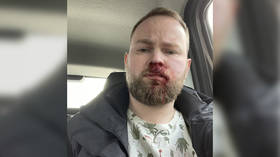HIV-positive blogger has nose broken in broad daylight street attack after interview about challenges of life with virus in Russia

Less than two weeks after going public with his experiences of living with HIV, Russian blogger Ilya Bronsky has found himself in an emergency room after being punched in the face by an unknown assailant shouting homophobic abuse.
Posting a photograph of his bleeding nose to Twitter on Saturday, the St. Petersburg-based communications consultant and Instagram star said that he had been receiving menacing messages. “Apparently the threats weren’t idle. Now I’m going to the trauma department.” The attacker reportedly called out to him in the center of the city, before shouting a homophobic slur and hitting him.
Later that day, he thanked his followers for their support and said that an x-ray had revealed “a fracture of the nasal bones and a collapsed septum.” “Next step is the police,” he said.
Also on rt.com HIV patients in parts of Russia can't get blood analyzed as laboratories focus on processing Covid-19 tests, advocacy group claimsLast month, Bronsky was among those featured in a series of interviews about life with HIV in Russia. As part of the article, published by online news site TJ, he said that “stigma about HIV is common, but I was lucky. I did not tell my relatives, but my friends know everything. Their attitude towards me has not changed.”
“Thanks to people who speak openly about the disease, myths die completely, and more and more people learn reliable information about HIV,” Bronsky said. “There are still many people who mistakenly believe that the disease concerns only LGBT people, drug addicts and sex workers. HIV can affect anyone, and this must be borne in mind.”
While the blogger says his understanding of the disease was helped by a long-term relationship with a young man who worked for the Red Cross, he insists that they took all available precautions. Instead, he claims to have contracted the blood-borne infection from a rogue dentists’ practice that reportedly failed to sterilize equipment and has since been shut down. More than 15 cases of HIV have since been recorded among its clients, he says.
Also on rt.com ‘You don’t have AIDS’: RT documentary takes on Russia’s top HIV denialist (VIDEO)Bronsky even used the attack to criticize Russians’ awareness of how the virus spreads, and the fact that with adequate medication it can be managed to the point where it is no longer transmissible. Since the attack, the blogger said that the most amusing comments have been, “Wasn’t the person who beat him up afraid to get infected like that?” “What a backward-looking people we are,” he added.
While many countries across the world have seen cases of HIV decline in recent years, the Avert NGO says the rate of infection is growing in Russia, with more than 250 people estimated to contract it each day. Experts have pointed to a lack of sexual education in schools and a large injecting drug user community as potential causes of the rise in cases. However, healthcare watchdog HIV Russia says that there was a decrease in the number of cases detected in 2020 compared to the previous year.
In November, a number of HIV patients across Russia’s regions complained that they were unable to get analyses of their blood as clinics focused on processing samples from suspected Covid-19 patients. The Ministry of Health recommends that newly diagnosed patients should have their blood checked as often as once a month initially.
Also on rt.com After years of research, top Moscow health official reveals Russia may be close to unveiling prototype 'HIV vaccine'Think your friends would be interested? Share this story!













